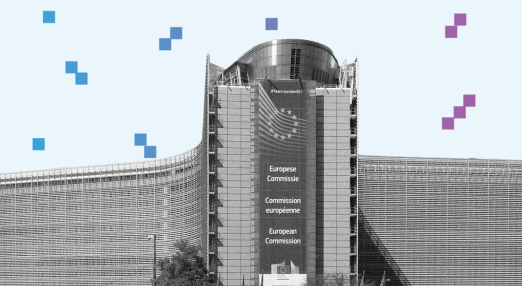Our work
EDRi is the biggest European network defending rights and freedoms online. We work to to challenge private and state actors who abuse their power to control or manipulate the public. We do so by advocating for robust and enforced laws, informing and mobilising people, promoting a healthy and accountable technology market, and building a movement of organisations and individuals committed to digital rights and freedoms in a connected world.
Filter resources
-

Chat Control is in the final stretch – but it could be a marathon, not a sprint
With final negotiations on the controversial CSA Regulation underway, you’d be forgiven for thinking that our digital rights are out of the woods. However, even though the recently-agreed position of EU Member States is a cautiously optimistic step, we are still far from a final deal. Perhaps the most worrying issue that remains is the threat of age verification becoming mandatory across all digital methods of private communication – a hugely disproportionate limitation on our privacy and free speech.
Read more
-

Breaking the extractive digital business model: a rights-based Digital Fairness Act
EDRi’s new position paper addresses the growing threat of manipulative and unfair platform design in the EU’s digital environment. It examines how deceptive interfaces, exploitative personalisation, and addictive design practices are embedded in today’s digital economy and why existing laws fail to tackle their structural roots. Grounded in a rights-based analysis, the paper argues that the Digital Fairness Act must deliver systemic change by embedding fairness by design and by default into the digital infrastructure that shapes our lives.
Read more
-

Open Letter: We say no to Big Tech mass snooping on our messages!
EDRi and 39 organisations are urging Members of the European Parliament to reject any extension of the the temporary ePrivacy derogration, also known as “Chat Control 1.0”, and to protect the rights that keep us safe from arbitrary snooping in our lives.
Read more
-

EDRi-gram, 18 February 2026
What has the EDRi network been up to over the past few weeks? Find out the latest digital rights news in our bi-weekly newsletter. In this edition: A competitiveness feast with our rights on the menu 🍽️
Read more
-

Czech ministry apologizes to journalist for blanket collection of mobile phone data
The Czech Supreme Court has ruled that the legal regulation of blanket collection of electronic communications data (known as data retention) violates European Union law in a "long-term and particularly serious manner." This decision is the result of a multi-year campaign by the organization IuRe. However, the responsible minister has not yet taken steps to end blanket collection.
Read more
-

Europe’s digital sovereignty starts with open source
EDRi submitted a response to the EU’s new open source digital strategy. We argue that free and open source software is not a niche technical choice, but a strategic foundation for Europe’s resilience, competitiveness and democratic autonomy.
Read more
-

US pressure on the Digital Services Act in the Netherlands
On 3 February 2026, the United States House Committee on the Judiciary launched a report in which EDRi member Bits of Freedom and Justice for Prosperity, among others, are called "censorous NGOs". In response, Bits of Freedom and Justice for Prosperity are issuing the following statement.
Read more
-

Ensuring human rights-based, global perspectives in the DSA enforcement: the DSA Human Rights Alliance’s guidelines
The DSA Human Rights Alliance has released 'Principles for a Human Rights-Centred Application of the Digital Services Act: A Global Perspective' to guide the European Commission, national policymakers, and regulators as the DSA moves from legislation to enforcement. The recommendations focus on the cross-border effects of DSA enforcement, empowering diverse groups to enforce users’ rights and providing input during enforcement actions. This will ensure that the law is applied in a way that respects international human rights standards and reflects regional perspectives.
Read more
-

How recommender algorithms threaten election integrity
A study published by EDRi member Asociația pentru Tehnologie și Internet (ApTI) Romania analysed how the recommender algorithms on Facebook, Instagram and TikTok distributed political content, during the 2025 presidential election. The quantitative analysis identified cases in which these social media platforms did not comply with either national electoral laws, nor with EU Regulations, such as the Digital Service Act (DSA).
Read more
-

European Commission’s plans will lead to worse regulations
EDRi is deeply concerned that the European Commission’s current plans to amend the Better Regulation framework will lead to worse lawmaking, not better. In its submission to the Commission, EDRi shares recommendations to ensure balanced representation, fairness, transparency, and meaningful safeguards in EU lawmaking.
Read more
-

Reopening GDPR and ePrivacy through the Digital Omnibus: a risky path for EU digital rights
EDRi has assessed the Digital Omnibus proposals affecting the General Data Protection Regulation (GDPR) and the ePrivacy framework. While presented as simplification, the changes amount to deregulation in effect, weakening fundamental rights safeguards, increasing legal uncertainty, and advancing through a process that falls short of democratic lawmaking standards.
Read more
-

AI Omnibus: Reject the proposals to undermine transparency in the AI Act
The European Commission’s dangerous and misguided Digital Omnibus proposal includes a dangerous rollback of transparency requirements in the AI Act. 60 civil society organisations, independent public authorities and individuals, including EDRi, urge EU lawmakers to reject a change that would risk weakening enforcement, legal certainty, and the protection of fundamental rights, while offering negligible benefits for companies.
Read more
